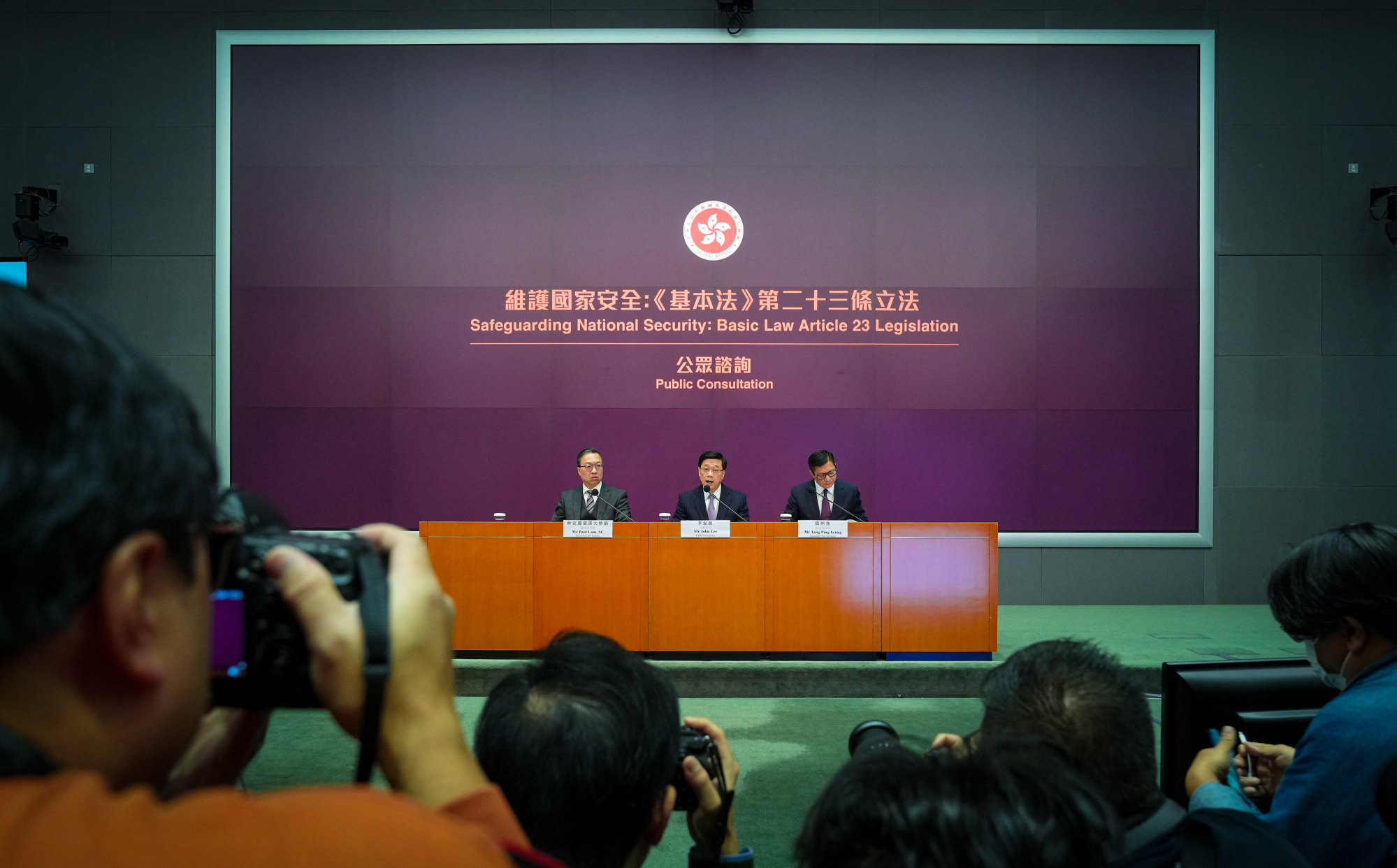
‘Political manipulation and double standards’: China slams Washington’s criticism of Hong Kong’s coming national security law
- Chinese foreign ministry spokeswoman Mao Ning says US ‘threw dirty water’ on Hong Kong’s proposed legislation while having many national security laws itself
- US State Department was ‘particularly concerned’ by the proposal to adopt ‘broad and vague definitions’ of ‘state secrets’ and ‘external interference’
China’s foreign ministry on Friday slammed Washington for its “political manipulation and hypocritical double standards” after it said “vaguely defined provisions” of Hong Kong’s domestic national security legislation would undermine the “one country, two systems” framework.
Ministry spokeswoman Mao Ning rebutted the statement issued by the United States on Thursday about the city’s public consultation for the new legislation, which is mandated under Article 23 of the Basic Law and set to sit alongside the 2020 Beijing-imposed national security law.
“China expresses strong disapproval and firm objection to the relevant US statement,” she said. “It is the constitutional responsibility of the Hong Kong SAR to complete the legislation under Article 23 of the Basic Law and plug the loopholes in safeguarding national security.
“It is also an inevitable requirement to achieve long-term peace and stability in Hong Kong and the long-term stability of ‘one country, two systems’ [governing principle].”

She criticised the US for its “political manipulation and hypocritical double standards,” saying it “threw dirty water and labelled” the city’s legislation while having many national security laws itself.
The US State Department said it was “particularly concerned” by the proposal to adopt “broad and vague definitions” of “state secrets” and “external interference”, which could be used to “eliminate dissent through the fear of arrest and detention”.
The city government had earlier said the remarks were “biased and misleading”.
On Wednesday, authorities in the city ended a month-long public consultation for the proposed legislation designed to target five new types of offences – treason, insurrection and sedition, theft of state secrets and espionage, sabotage and external interference.
US concerned over ‘broad and vague’ definitions in Hong Kong security law
The government said that 98.6 per cent of the 13,147 submissions “made positive comments”, with 93 opinions opposing the new law. It said the figures showed public consensus for the legislation to be completed as soon as possible.
A commentary article published by Xinhua news agency on Thursday praised the consultation for being “organised in a scientific and orderly fashion” and served well the purpose of “enhancing understanding, in-depth deliberation, offering assurances, and strengthening confidence”.
“This is an open, transparent, high-quality and efficient public consultation,” the commentary said, adding “everyone has said that the Article 23 legislation must be enacted as soon as possible” to pave the way for stability and promote economic growth.
The commentary singled out the proposed sedition offence as an example, saying that city officials stated clearly that there was “no problem as long as it is legitimate criticism based on facts”.

The article also said it was “no surprise” that “anti-China elements” and “external forces with ulterior motives” had tried to discredit and block the legislation efforts.
“But they are at the end of their rope and can only repeat clichés in different approaches, such as the Article 23 legislation will ‘restrict freedom’, ‘undermine human rights’ and ‘destroy prosperity’,” the article added.
“Knowledgeable people from all walks of life in Hong Kong and the world have recognised the sinister intentions of external forces to interfere in the city’s affairs, and will no longer be deceived and incited by them.”
Commentaries by the same author, “Gangaoping”, have all been reposted on the official website of the Hong Kong and Macau Affairs Office.
His previous article was about the latest “inspection” visit by office director Xia Baolong, listing out statistics to illustrate Hong Kong’s appeal for doing business and calling negative comments about the city’s prospects “a lie”.
Hong Kong’s Article 23 security law needs public interest defence: lawyers
Chambers and professional organisations in the city have mostly indicated support for the legislation in principle while voicing concerns about the consultation document’s vague and broad definitions, such as those relating to the offences involving “state secrets” and “external forces”.
The Hong Kong General Chamber of Commerce urged clarity on “state secrets” and more information on the scope of excluded activities for the offence, as it was concerned that “broad, general” provisions open to different interpretations might not provide certainty for businesses to know what they have to do to comply.
In a 129-page position paper, the Hong Kong Bar Association expressed concern about the “commercial implications” of definitions of “state secrets” that only relate to Hong Kong affairs, and noted the proposed criteria for “external forces” were so broad that they could catch any Hong Kong resident visiting another jurisdiction.
The British government has also argued that the consultation document’s “vague references” to external forces and the new offence of external interference might threaten legitimate and lawful diplomatic and consular activity as protected in the Vienna Convention on Consular Relations.

